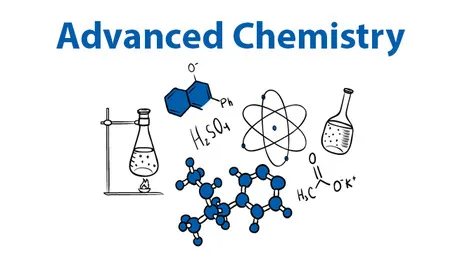
The Organic Chemistry Course 
This Organic Chemistry Course will help students identify organic compounds, interpret skeletal and displayed formulas, determine functional groups, describe the synthesis of organic compounds, explain and compare organic compound acidity/basicity/reactivity, and determine the organic compounds present in a solution. It is a great way to gain a better understanding of organic chemistry and its applications. ▼
ADVERTISEMENT
Course Feature
![]() Cost:
Cost:
Free
![]() Provider:
Provider:
Udemy
![]() Certificate:
Certificate:
No Information
![]() Language:
Language:
English
Course Overview
❗The content presented here is sourced directly from Udemy platform. For comprehensive course details, including enrollment information, simply click on the 'Go to class' link on our website.
Updated in [May 25th, 2023]
This Organic Chemistry Course provides an introduction to the fundamentals of organic chemistry. Students will learn to identify organic compounds, interpret organic compound skeletal and displayed formulas, determine functional groups, describe the synthesis of organic compounds, explain and compare organic compound acidity/basicity/reactivity, and determine the organic compounds present in a solution. Through lectures, demonstrations, and laboratory activities, students will gain a comprehensive understanding of the principles of organic chemistry.
[Applications]
The application of the Organic Chemistry Course can be seen in many areas. Students can use the knowledge gained from the course to identify organic compounds, interpret organic compound skeletal and displayed formulas, determine functional groups, describe the synthesis of organic compounds, explain and compare organic compound acidity/basicity/reactivity, and determine the organic compounds present in a solution. This knowledge can be applied in the fields of medicine, agriculture, and biochemistry. Additionally, the course can be used to help students understand the fundamentals of organic chemistry, which can be beneficial for those pursuing a career in the sciences.
[Career Paths]
1. Organic Chemist: Organic chemists are responsible for researching and developing new organic compounds and products. They use their knowledge of organic chemistry to create new products and processes, as well as to improve existing ones. Organic chemists also analyze the properties of existing compounds and develop new methods of synthesizing them. The demand for organic chemists is expected to grow as the need for new and improved products increases.
2. Pharmaceutical Chemist: Pharmaceutical chemists are responsible for researching and developing new drugs and medicines. They use their knowledge of organic chemistry to create new drugs and medicines, as well as to improve existing ones. Pharmaceutical chemists also analyze the properties of existing drugs and develop new methods of synthesizing them. The demand for pharmaceutical chemists is expected to grow as the need for new and improved drugs and medicines increases.
3. Chemical Engineer: Chemical engineers are responsible for designing and developing new processes and products. They use their knowledge of organic chemistry to create new processes and products, as well as to improve existing ones. Chemical engineers also analyze the properties of existing processes and products and develop new methods of synthesizing them. The demand for chemical engineers is expected to grow as the need for new and improved processes and products increases.
4. Environmental Chemist: Environmental chemists are responsible for researching and developing new methods of protecting the environment. They use their knowledge of organic chemistry to create new methods of reducing pollution and improving the environment. Environmental chemists also analyze the properties of existing pollutants and develop new methods of synthesizing them. The demand for environmental chemists is expected to grow as the need for new and improved methods of protecting the environment increases.
[Education Paths]
1. Bachelor of Science in Chemistry: This degree program provides students with a comprehensive understanding of the fundamentals of chemistry, including organic chemistry. Students will learn about the structure and properties of organic compounds, the synthesis of organic compounds, and the reactivity of organic compounds. Additionally, students will gain an understanding of the principles of chemical thermodynamics, kinetics, and spectroscopy. This degree program is ideal for those interested in pursuing a career in the chemical industry or in research.
2. Master of Science in Organic Chemistry: This degree program provides students with an in-depth understanding of organic chemistry. Students will learn about the structure and properties of organic compounds, the synthesis of organic compounds, and the reactivity of organic compounds. Additionally, students will gain an understanding of the principles of chemical thermodynamics, kinetics, and spectroscopy. This degree program is ideal for those interested in pursuing a career in the chemical industry or in research.
3. Doctor of Philosophy in Organic Chemistry: This degree program provides students with an advanced understanding of organic chemistry. Students will learn about the structure and properties of organic compounds, the synthesis of organic compounds, and the reactivity of organic compounds. Additionally, students will gain an understanding of the principles of chemical thermodynamics, kinetics, and spectroscopy. This degree program is ideal for those interested in pursuing a career in the chemical industry or in research.
4. Master of Science in Pharmaceutical Chemistry: This degree program provides students with an in-depth understanding of the chemistry of pharmaceuticals. Students will learn about the structure and properties of pharmaceuticals, the synthesis of pharmaceuticals, and the reactivity of pharmaceuticals. Additionally, students will gain an understanding of the principles of drug design, drug delivery, and pharmacology. This degree program is ideal for those interested in pursuing a career in the pharmaceutical industry or in research.
Course Syllabus
Introductory Topics
Hydrocarbons
Halogen Derivatives
Hydroxy Compounds
Carbonyl Compounds
Carboxylic Acids and Derivatives
Nitrogen Compounds
Pros & Cons

Clear explanations.

Useful word documents.

Good for exam review.

Mistake in example.

Fast pace.

Poor nomenclature explanation.
Course Provider

Provider Udemy's Stats at AZClass
Discussion and Reviews
0.0 (Based on 0 reviews)
Explore Similar Online Courses

JS Assessment: Assess your Javascript skills

AssertJ: Fluent Assertion In Test Automation

Python for Informatics: Exploring Information

Social Network Analysis

Introduction to Systematic Review and Meta-Analysis

The Analytics Edge

DCO042 - Python For Informatics

Causal Diagrams: Draw Your Assumptions Before Your Conclusions

Whole genome sequencing of bacterial genomes - tools and applications

General Chemistry: Concept Development and Application

Advanced Chemistry

Free Chemistry Tutorial - Chemistry 101 - Chemistry in Society
 Related Categories
Related Categories
 Popular Providers
Popular Providers
Quiz
 Submitted Sucessfully
Submitted Sucessfully
1. Which of the following is a functional group?
2. Which of the following is an example of an organic compound?
3. Which of the following is an example of a synthesis of organic compounds?


Start your review of The Organic Chemistry Course